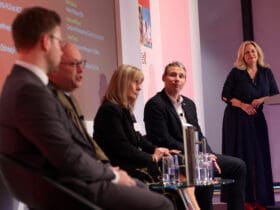Richard Murphy, International Partner and Head of Cushman & Wakefield’s Cardiff office said:
“2020 Vision is ironically more difficult than it has ever been, when looking forward to the New Year. The outcome of the General Election brings a degree of much needed political stability, with at least some of the unknowns now being known. However, there remains considerable uncertainty for Wales and the UK as a whole.
We anticipate a rekindling of cautious activity within the occupational and investor markets in the first quarter of the year. The latter being driven by the volume of money still available to invest in those assets which can produce reasonable and importantly, stable returns.
2020 is likely to be something of a watershed year in the retail sector as Christmas trading results lead retailers or their creditors, to take some action. Furthermore, following the recent M&G announcement preventing withdrawals from its property fund to ensure orderly asset disposal, many landlords of retailers and owners of shopping centres (or their bankers) will need to make decisions in-light of the pressure for mark to market asset pricing.
In South Wales, there remains a shortage of Grade A office supply and high quality industrial/distribution space and there is little sign that this will ease in 2020. However, the impressive plans for Cardiff’s Central Quay are proceeding apace, following the tremendously positive impact that Central Square has had on the vibrancy of the City (and in turn its office rents). Central Square and Capital Quarter the City’s two largest office scheme are now practically filled.
Private Rented Sector (PRS) and Build to Rent (BTR) have yet to gain momentum in South Wales but is a sector to watch, particularly given its potential to form part of a mixed-use solution for the revitalisation of urban areas currently dominated by retail.
The hospitality sector is likely to receive a boost from bed space demand created by the International Conference Centre, with investors and developers actively seeking opportunities.
We anticipate further instances of Public Sector / Private Sector partnership initiatives, based upon trust and commerciality. This has become a welcome and intrinsic part of creating real place-making progress in Wales and will be increasingly important as projects, such as The South Wales Metro progress.
In summary, a challenging macro-environment with ongoing uncertainty and lack of definition in relationships with worldwide trading partners, coupled with property cycle concerns. However, South Wales and its principal centres are making strong progress in becoming vibrant connected places to do business, which is attracting the attention of national and international employers and investment funds, who were previously strangers to Wales.







Leave a Reply
View Comments